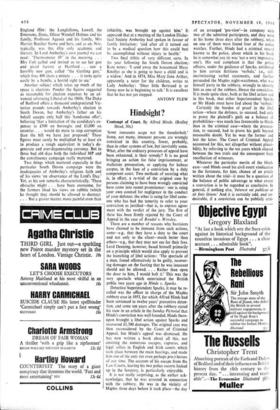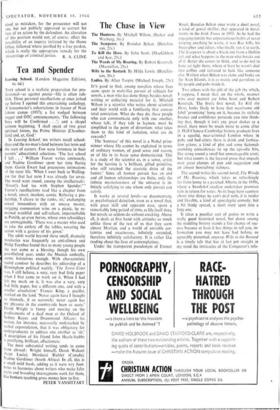infidelity, was brought up against him.' It appeared that at
a meeting of the London Dialec- tical Society Amberley had spoken in favour of family limitation : 'and after all it turned out to be a medical question how this could best be accomplished without injury to health.'
Two final titbits of very different. sorts. In the year following the South Devon election,t Kate notes : 'I send away the housemaid Mary Knollys as she is going to have a child and is a widow.' And in 1874, Miss Mary Jane Arthur, apparently a tutor for the children, writes to Lady Amberley: 'Dear little Bertrand is so funny now he is beginning to talk.' It is excellent that he has not yet stopped.
ANTONY FLEW
Hindsight?
Contempt of Court. By Alfred Hinds. (Bodley Head, 30s.) 'Some innocents scape not the thunderbolt' Some, not many, innocent persons are wrongly convicted in this country, fewer, probably, than in other systems of law, but inevitably some. What, after the ordinary processes of appeal have been exhausted, is their remedy? It is no good bringing an action for false imprisonment, or malicious prosecution, or applying for habeas corpus, in the face of a conviction by a duly competent court. Two methods of securing what is, in effect, a re-trial of the original case by persons claiming to have been wrongly convicted have come into recent prominence : one is suing your own counsel for negligence in the conduct of your defence; the other is suing for libel some- one who has had the temerity to refer to your conviction as justified—that is, to express agree- ment with the verdict of the jury. The first of these has been firmly rejected by the Court of Appeal in the case of Rondel v. Worsley. of an arranged 'pre-view'—in company with two of the admitted participants, and they were at his home three days after the robbery, when on one of them were found four of the stolen watches. Further, Hinds had a criminal record known to the police, about which in his book he is somewhat coy (it was 'not a very impressive one'). His real complaint is that the police officers, under the guidance of Sparks, attributed to him certain fictitious 'verbals,' i.e., self- incriminating verbal statements, and further persuaded the Maples night-watchman, who was himself party to the robbery, wrongly to identify him as one of the robbers. Hence the conviction. It is made quite clear, both at the libel action and in this book, that either Superintendent Sparks or Mr Hinds must have lied about the 'verbals.'
Certainly the burden of proof in the libel action—where the defence, to succeed, had only to prove the plaintiff's guilt on a balance of probabilities—was much less favourable to Hinds than in the criminal case—where the prosecu- tion, to succeed, had to prove his guilt beyond reasonable doubt. Yet he won the former and lost the latter. The Court of Criminal Appeal accounted for this, not altogether without plausi- bility, by referring to the ten years which elapsed between the two trials and the consequent hazy recollection of witnesses.
Whatever the particular merits of the Hinds case—and Hinds owed his civil court vindication to the fortunate, for him, chance of an article written about the trial—it must be a question of the balance of public advantage to what extent a conviction is to be regarded as conclusive. In general, if nothing else, 'Interest rei publicae ut sit finis Whim.' And it is certainly odd, and un- desirable, if a conviction can be publicly criti-
Objective Egypt
Gregory Blaxland
"At last a book which sets the Suez crisis against its historical background of the countless invasions of Egypt . . . a clear account . . . admirable book".
—Birmingham Post Illustrated 37/6
Street, Brendan Behan once wrote a short novel, a kind of genial thriller, that appeared in instal- ments in the Irish Times in 1953. As he had the engaging (untidy but unpretentious) habit of never keeping anything he wrote, it was Rae Jells, his biographer and editor, w ho finally ran it to earth. The Scarperer is about a break-out from a Dublin jail and what happens to the man who breaks out of it. Better (he conies to think, and so do we) to have sat tight there, where at least he wasn't shut into coffins and tattooed to look like someone else. Written when Behan w as alone and broke on the Aran Islands, it is as matey and garrulous as the people and pubs inside it.
Two others with the gift of the gab (by which, I suppose, I mean that, on the whole, manner wins over matter) are John Scott and Robert Kroetsch. The first's first novel, To Kill the Hero, looks likely to have that wearisome old label 'promising' hung on it, because its stylistic bounce and confidence persuade you into think- ing that, though it isn't any great shakes as a novel, there must be much more to come after it. Half-Chinese Cambridge history graduate lives in a squalid, near-criminal London where in pubs and bed-sitters there is drink and fornica- tion galore; a kind of plot and some fictional- sounding coincidences tie up the episodic bits, like string round a small but unmanageable joint; but what counts is the layered prose that unpeels over great clumps of pun and suggestion and an almost bewitching richness.































 Previous page
Previous page